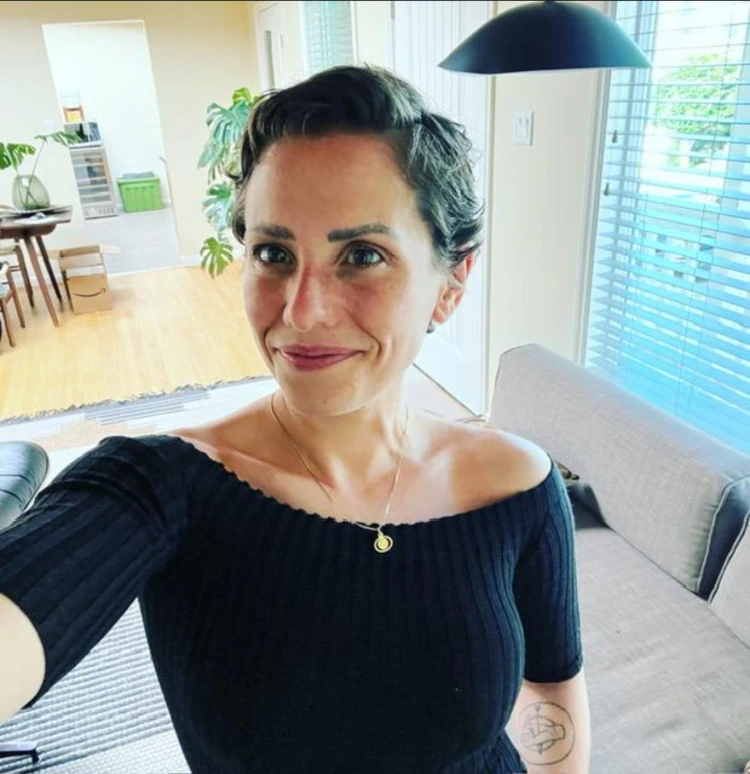by Devin Boyle

I will not pretend to know what it’s like to lose a limb; it is not part of my story. What I can share with you is my experience as a different kind of amputee, as a human whose breasts—long considered part of my identity, literally and figuratively—were cut from my body, and the ripple effect that this loss has had on my life.
Last year, at age 37, I was diagnosed with breast cancer. This cancer impacts one in eight women in their lifetime, but only 5 percent of women under age 40 (though this number is rising). As a result of my diagnosis, I had a double mastectomy, losing both of my breasts. This surgery coincided with the preventative removal of my ovaries to help avert recurrence: a double assault to my female identity.
Though my experience is not identical to losing a limb, there are parallel threads in our stories. And because October is Breast Cancer Awareness Month, it seems like an opportunity to reflect on our common suffering as human beings. There’s the assault to our identities, our sense of self-worth, and our personal and romantic relationships. There’s also the tremendous grief we feel, which is compounded by guilt—for the burden we believe we place on others, for surviving when others did not, and for feeling helpless and having to ask for support.
Our lives will never go back to the way they were. Our bodies will never look like they used to. My ability to have children will never come back, nor will my breasts magically reappear. The health care system will never work in my favor. I will always be annoyed when someone calls me an inspiration and I will live with the constant fear that the disease, which caused my amputation, will recur. I am forever changed.
Several months ago I wrote my first poem about my experience, an exercise I would recommend to anyone who is seeking an emotional release. I wrote this at a dark moment, when anger was in the driver seat of the long, pothole-laden road of my grieving process. The poem’s title refers to a famous quote (attributed to William Faulkner) about a writer’s obligation to cut narrative elements that you hold incredibly dear for the greater good of the overall story. You might have to remove a vivid scene, an engrossing subplot, or even an entire character you’ve grown to love. Losing them hurts, but it serves a higher purpose.
The same principle seemed to apply to the pieces of my body I had to remove to save my life. Spoiler alert: I am no poet! Just a human trying to find ways to heal deep emotional wounds.
Kill Your Darlings
Infiltrating, liquidating
microscopic cells
dividing, spreading.
Contaminate.
Amputate.
Comply.
Unplanned, unwanted
diagonal scars.
missing breasts
fake chest.
Euthanized fertility.
Desiccated desire.
Eradicated unconsciously
prized identity.
Acquiesce.
Accept.
Adapt.
Kill your darlings.
Save your life.
Writing this poem changed my perspective about my experience. While writing it I had an Aha! moment—I was not only alive, but I fought with ferocity and survived. Killing my darlings radically altered my story, but it ensured that the story didn’t end. There is more to be written.
A few weeks later I wrote another poem to express my change in mindset. It’s not about killing anything; it’s about a flower’s struggle to survive.
Lotus
deep-rooted in mud,
in the depths,
battling–for breath
it suffers,
as it pushes through
the muck, it migrates
toward warmth.
it suffers,
to achieve the life–
it deserves,
while it endures,
it suffers,
as it forces
through sludge,
breaching the surface,
it suffers,
with patience,
petal by petal,
it blooms.
having suffered,
it transcends.
As many people who have experienced amputation can tell you, the lessons we learn as we push through the muck can change us for the better. Here’s some of what I’ve learned through my experience with breast cancer:
I love and respect the new me. I am so much stronger than I thought I was, and I have a newfound resilience.
The new me will never fit back into my old life. I’ve learned so much about myself and others that I am too big for that life now. I’ve outgrown it. And that’s a good feeling.
Cancer brought me closer to the people I love. They showed up for me in ways I never thought were possible. And as a result, our relationships are stronger than ever.
I have a newfound passion—writing poetry. Who knew it was a form of therapy?
Such realizations, in fact, have made me grateful for what I’ve gone through. And, if you catch me on a good day, you might even hear me say: “It was all worth it.”
Devin Boyle lives with her dog Cabo in Minneapolis. She works in the disability advocacy space, helping to create employment opportunities for people with disabilities and lay the foundation for a more diverse, equitable, inclusive, and accessible workplace.